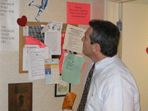 |
 |
 |
 |
 |
 |
 |
 |
 |
 |
 |
 |
 |
 |
 |
 |
 |
 |
| Sign up for our free newsletter |
|
Preteen and Teenage Counseling
 The Center offers short-term psychodynamic therapy that is goal-oriented. Since 1983, Andrew Evangelista has been working with adolescents and teenagers in many different modalities, hospital settings, in-patient alcohol and drug rehabilitation programs, school systems and out patient counseling programs. The Center offers short-term psychodynamic therapy that is goal-oriented. Since 1983, Andrew Evangelista has been working with adolescents and teenagers in many different modalities, hospital settings, in-patient alcohol and drug rehabilitation programs, school systems and out patient counseling programs.
Our approach is non-threatening, engaging and but direct. Our staff will assist you in getting your son or daughter into counseling. After our phone assessment, we will find the best counselor to meet your needs so a smooth transition can be established for both parents/guardians and your child.
The first step is clearly understanding and defining the problem. A comprehensive assessment with the parents and child separately and then together to obtain information will help that transition into counseling.
The second step is education and support for all of the family members.
That is why before an appointment is made we request from the parents and/or guardians a list of concerns that they are experiencing with their youngster. This approach helps frame the concerns and establish a historical prospective and a chronological and comprehensive viewpoint of the concerns. It also establishes a baseline and includes the family in the process and offers a better response to therapy. We are experienced to deal with many behavioral, attention, conduct and oppositional concerns as well as alcohol and drug issues and grief reactions.
- CCL has the capacity for both quick urine screens with 1 minute results and laboratory results for urinalysis with 2 to 3 day results.
- We will provide a comprehensive assessment that includes dealing with the family's concerns, a friendship evaluation and an alcohol and drug assessment.
- We offer parents group support and education, and for teens, we offer early intervention and didactic groups for support, understanding and education.
Parents: pay attention to the signs of alcohol and drug usage.
If you notice any of these behaviors it may be a sign that your teenager is involved with chemical abuse. Investigate the warnings and get a professional assessment.
Call us at 973-226-4773
Some of the physical signs are:
- Gradual or rapid change in sleeping habits
- Redness or Bloodshot eyes and carrying eye drops
- Slurred, agitated, irritable or forced speech
- Change in eating habits, weight loss or gain
- Unexplained bruises
- Not caring about appearance/poor hygiene, change from regular routine
- Sore throats and constant redness or sick more than usual
- Reckless behaviors causing injuries
Behavioral Signs
- Sneaky ; lying and covering up, hiding behaviors
- Not caring anymore, sudden or gradual drop in grades
- Consequences don't do anything, non caring, no motivation
- Seems out of control, your suspicions of usage have increased
- Gradual or sudden loss of interest in previously enjoyed activities
- Seems emotionally unstable
- Sleeps more than usual
- Appears depressed, isolated, and irritable when around family
- Missing school or work, late, cutting class, leaving school grounds
- Responsibilities at school or work have slipped severely
- Calls from teachers or co-workers, poor interim reports, failure or warning notices
- School suspects usage, friends or family suspects usage.
- Secretive behavior
- Avoiding eye contact, going directly to room to avoid family
- Money missing or constantly asking for more money, stealing from brothers and sisters
- Doesn't face consequences, doesn't do anything, non caring, no motivation
- Wanting to going out every night
- Change in friends or peer group, suspicious behaviors
- Change in clothing or appearance
- Odors on clothing or breath
- Heavy use of over-the-counter preparations to reduce eye reddening, nasal irritation, or bad breath
- Alcohol missing from house
- Prescription medicine missing
- Unexplained disappearances for long periods of time
- Running away
- Paraphernalia, unusual containers, or wrappers
Call for more information, if you have any questions or would like to make an appointment.
|
















 The Center offers short-term psychodynamic therapy that is goal-oriented. Since 1983, Andrew Evangelista has been working with adolescents and teenagers in many different modalities, hospital settings, in-patient alcohol and drug rehabilitation programs, school systems and out patient counseling programs.
The Center offers short-term psychodynamic therapy that is goal-oriented. Since 1983, Andrew Evangelista has been working with adolescents and teenagers in many different modalities, hospital settings, in-patient alcohol and drug rehabilitation programs, school systems and out patient counseling programs.